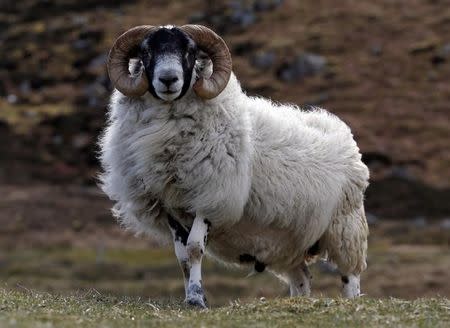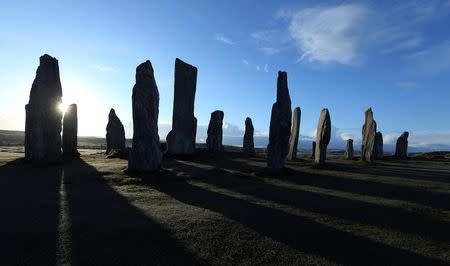Scottish isle a world away from fireworks of native son Trump
By Elisabeth O'Leary ISLE OF LEWIS, Scotland (Reuters) - Donald Trump has played up his family roots from Lewis, an island off the northwestern tip of Scotland, but his success in the U.S. Republican presidential battle has not drawn the kind of rapture the billionaire might like from his home crowd. Trump's mother, Mary Anne MacLeod, emigrated to the United States from the Lewis village of Tong in the early 1930s, and a visit from her property mogul son would certainly interest the friendly inhabitants of this weather-beaten isle. But the kind of fiery oratory that has catapulted him to unexpected victories in the U.S. primaries might be taken with a pinch of salt, according to Tim Durbin, manager of the post office in the capital Stornoway. "People here like proof and anything less than that is suspect," said Durbin, a 43-year-old American originally from Kentucky who has lived here for a decade. "There would certainly be lots of talk about him after he left, but the talk would be subdued and the laughter would be gentle." The islanders' wariness is apparent when the New Yorker's name is mentioned; many smile politely and refuse to talk about him at all, making it difficult to gauge sentiment among the 20,000-strong population. But even such silence is significant in a place of strong community ties, according to critically-acclaimed Lewis novelist Kevin MacNeil. "If people from Lewis were genuinely supportive of Trump they would be more vocal in their views," he said. "The lack of support for a grandson of the island speaks volumes." An exception is a Facebook page called "Isle of Lewis supports Trump for President" which has 84 "likes". The businessman has become the presumptive Republican nominee with a headline-grabbing campaign in which he has traded insults with rivals. A suggestion Muslims should be banned from entering the United States drew criticism from Europe and led to the withdrawal of Scottish business and academic accolades. Trump argued last month, in a column in Aberdeen's Press and Journal newspaper, that he had won over the sceptical people of Scotland through tenaciousness after he built his golf course despite environmental hurdles, local opposition and lawsuits. "Scotland has already been won – and so will the United States," he wrote. Trump called his Scottish business project a "labour of love" and his Trump International Golf Links website has a section dedicated to his Scots' family genealogy. FREEZING GUSTS "It would be funny if Trump won. It might boost tourism," said Donald, a Lewis pensioner living near the MacLeod family seat. "But only for a while," interjected his wife Anne, with the caution habitual of the island. The couple recalled that Trump's mother would visit from the United States in the summer, and Trump's millionaire father Fred would ship over a Cadillac to carry her around the marshy island during her stay. "You'd end up in the ditch if you were trying to drive past them, I remember that," said Donald with a laugh. Lewis, in the Outer Hebrides island chain, is a picturesque place, dotted with lakes, hills and open tracts of moor and almost devoid of trees. A freezing gust can whip your breath away or a warm breeze can surprise you with its gentleness. Trump stopped for a brief visit in 2008, jetting in on his private plane when he was trying to launch a golf business near Aberdeen in mainland Scotland and holding a news conference. He has not returned since, although he has visited Scotland several times and runs two golf courses on the mainland, one in Ayrshire and another in Aberdeenshire. He was then offered the possibility of an investment in Lews (sic) Castle, a run-down Victorian country house in Stornoway built by another millionaire, Sir James Matheson, when he bought the island in the mid-19th century. "He just didn't think he was going to make any money out of it. He knows his roots are here but he's more interested in his golf investments elsewhere," said council official Nigel Scott. People are not easily swayed in Lewis, where strong bonds between neighbours and family are necessary to withstand the harshness of rural life, said Calum Iain Macleod a Presbyterian minister from the parish where Mary Anne MacLeod was born. "When the Atlantic is throwing a force 10 and you can barely stand and your windows are caked with salt, it is extreme and it is tough," he said. "Being on this island where The Minch separates you from the centre of gravity, you feel more vulnerable," he said, referring to a strait that separates the Outer Hebrides from the mainland. The influence of the Church itself, which is well-attended, also makes for a tranquil place. Sundays are still almost entirely commerce-free and pubs and hotels which serve alcohol are very few, in contrast to the rest of Britain. Trump's desire to recall his historic Scottish roots may have another purpose, suggests novelist MacNeil. "Perhaps he simply wants a Scotland-shaped mirror to reflect back his own perceived glory." (Reporting By Elisabeth O'Leary; Editing by Estelle Shirbon and Pravin Char)

 Yahoo Sports
Yahoo Sports 


